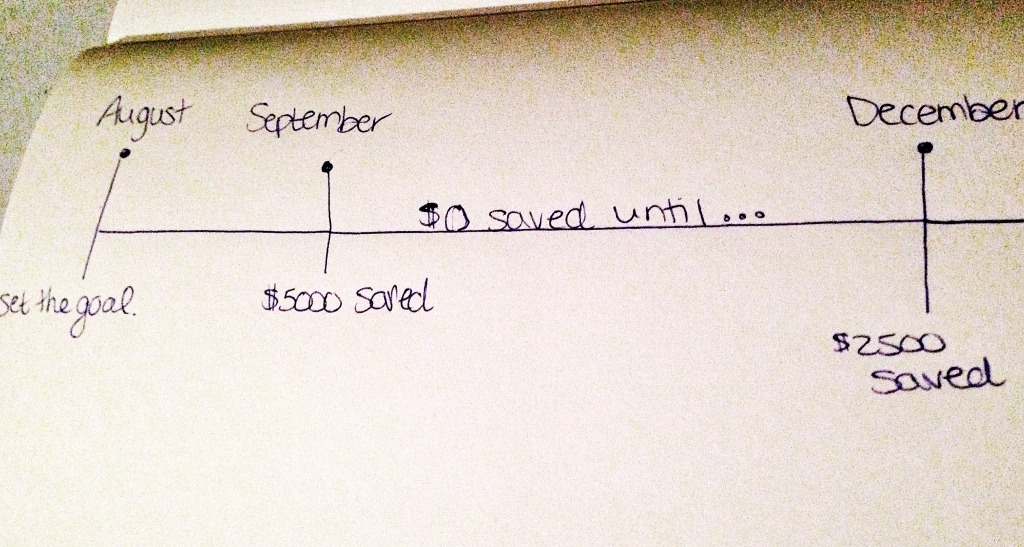You Can Do Better: Set Shorter Deadlines to Beat Procrastination
Every week, I tell myself that I will write an article for this blog during one of my weekday 5:00 AM writing sessions.
Every week, I end up writing it on Saturday or Sunday morning, and editing it on Sunday evening.
Since I publish on Mondays, this means that every week, I procrastinate until the last minute and pound out an article in the writing period before I publish it.
I’m not alone in this sensation of procrastination. Unless there is a compelling reason to not procrastinate, humans have the tendency to wait until the last few days before something is due to actually get started.
We Procrastinate in Setting the Startline…
If you are in debt, how many times have you told yourself “I’ll start paying more of it down in the New Year” or “when the summer is over”, or some other time in the vague future?
You reach the fall or the New Year and it turns into the spring or after Christmas, because you didn’t have a plan, let alone a target date, and you procrastinate further.
You continue making minimum payments on your debt and a few years pass by and you wonder why you didn’t start paying down earlier, because now you have incurred hundreds or thousands of dollars in interest.
We procrastinate on setting real startlines, let alone deadlines.
And Set Low Standards For Ourselves When Setting the Deadline.
We have terribly low standards for ourselves. When we decide we want to do something, we give ourselves a ridiculous amount of time to get it done.
This is tied to two things:
1. Self belief: “I have to give myself a long deadline because I don’t think I can do it in less time”
2. Timeliness, or and the misguided notion that SMART goal concept is the be-all, end-all of goal setting and that “realistic” piece means that we have to be easy on ourselves.
Take my goal to save $12,000 for travel by February, for instance. I had seven months to reach this goal.
I’m accountable to my readers, myself, my husband, and our budget since I already have many travel plans. There’s no turning back with this goal, so I know I must reach it.
When I first set the goal, I was excited. It was new, shiny, and important, so I saved $5,000 within the first few weeks of setting it.
Then: nothing. I have spent the past two months saving very little. I was travelling, then excusing myself for not saving more because I was getting back into the groove of having a full paycheck.
Come December, there is no doubt that I’ll realize the error of my procrastinating ways, panic, and save the next $7,000 over the two month period.

(In reality, since I’m writing about it now, I’ve transferred more money into my savings, but that is what would have happened had I not decided to write this post).
What I really should have done is set a higher standard for myself.
I probably could have reached this goal in four or five months. If I had given myself four months, I would have been pushed to find a way to make a little more or cut back on another expense.
Setting Unrealistic Deadlines
In the 4 Hour Work Week, Tim Ferriss writes about the concept of setting unrealistic deadlines to avoid procrastination and increase productivity.
The concept is this: Instead of giving yourself ample time to meet a goal or finish a project, setting an unrealistic deadline will help you actually get the goal or project done and likely increase the quality of it.
Think about all of those times in school when you had too much time to do something, whether it was writing a paper or studying for an exam, and you didn’t even get started on it until a couple of days before it was due.
If your professor decided not to tell you about the exam until a couple of days prior, you would likely have done just as well on it, if not better. The time constraint may have focused your efforts in on studying only the relevant material.
The concept of setting these types of deadlines strips away the time you would have otherwise spent procrastinating and gives you only the bare amount of time that it takes to get the job done.
It also removes the period of unfocused and counterproductive analysis, planning, and questioning. When you have very little time to complete the project, you are forced to do good work in less time.
Take my travel savings goal, for example. Since I have such a long deadline, I could be spending these months strategizing about how I might cut back on my expenses and make extra money. I might be analyzing a budget to ensure that I will be on track, and questioning whether I should have set the goal at $11,000 or given myself a couple more or less weeks to reach it.
Are any of these things productive? NO! I might tell myself that they are productive, since I am engaging in these activities as a result of the goal, but they are just another distraction, pulling my focus away from the goal itself and helping me procrastinate in actually doing the important work.
How to Set an Unrealistic Deadline (And How to Know When It’s Unrealistic Enough)
Unrealistic deadlines are difficult to set, because you will likely want to default back on going easy on yourself. Ask yourself this, without lying to yourself to get out of making real progress:
If this was a work project or objective, and my boss told me I had to reach it in [x] amount of days or I would lose my job, would the deadline be too close for comfort and make me get my butt into gear right away?
If the answer is no (and be honest with yourself) then bump the deadline up.
If the answer is yes, then give yourself a very small amount of time extra (ie if your deadline was in a week, give yourself a week and one day).
If the deadline is too unrealistic, you’ll be paralyzed in inaction because of fear. We need to have a tiny bit of time to procrastinate, before setting ourselves into motion. This helps us strategize, gather our thoughts, and focus ourselves.
Raise your self-standards, and set a deadline that sounds a bit crazy. Don’t join the masses of people who set deadlines that are solidly average and struggle to meet them.


I am awful at procrastinating. This comment, right here… it’s procrastinating. I will churn out a LOT of work in about twenty minutes as a month end deadline looms, but I can’t seem to make myself focus before then. Ugh. I am a fan of doing secondary tasks as a primary importance task looms closer… so I usually procrastinate by getting other things done, which I guess is good?
I’m trying to get into the habit of setting deadlines that are a few days in advance and for the most part I’ve been sticking with it. I need to do this, especially with a kid because life always gets in the way and sometimes I need those days of extra padding!
I’m a big procrastinator. Usually I just try to be honest with myself and motivate myself. But after a while, I need a few tricks. Thanks for padding my sleeves a little more!